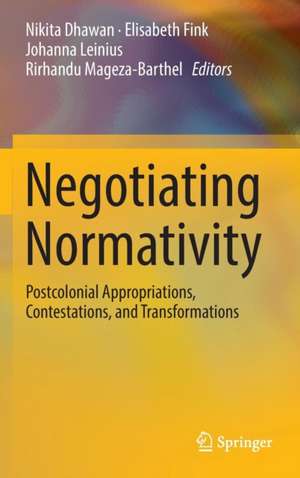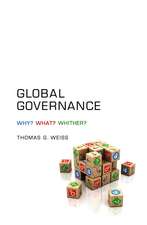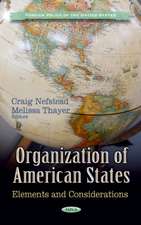Negotiating Normativity
Editat de Nikita Dhawan, Elisabeth Fink, Johanna Leinius, Rirhandu Mageza-Barthelen Limba Engleză Hardback – 7 iul 2016
| Toate formatele și edițiile | Preț | Express |
|---|---|---|
| Paperback (1) | 634.06 lei 6-8 săpt. | |
| Springer International Publishing – 30 mai 2018 | 634.06 lei 6-8 săpt. | |
| Hardback (1) | 640.22 lei 6-8 săpt. | |
| Springer International Publishing – 7 iul 2016 | 640.22 lei 6-8 săpt. |
Preț: 640.22 lei
Preț vechi: 753.20 lei
-15% Nou
Puncte Express: 960
Preț estimativ în valută:
122.61€ • 126.33$ • 102.71£
122.61€ • 126.33$ • 102.71£
Carte tipărită la comandă
Livrare economică 24 februarie-10 martie
Preluare comenzi: 021 569.72.76
Specificații
ISBN-13: 9783319309835
ISBN-10: 3319309838
Pagini: 271
Ilustrații: VIII, 253 p. 2 illus. in color.
Dimensiuni: 155 x 235 x 16 mm
Greutate: 0.54 kg
Ediția:1st ed. 2016
Editura: Springer International Publishing
Colecția Springer
Locul publicării:Cham, Switzerland
ISBN-10: 3319309838
Pagini: 271
Ilustrații: VIII, 253 p. 2 illus. in color.
Dimensiuni: 155 x 235 x 16 mm
Greutate: 0.54 kg
Ediția:1st ed. 2016
Editura: Springer International Publishing
Colecția Springer
Locul publicării:Cham, Switzerland
Cuprins
Part I. Appropriating Transnational Norms.- Part II. Postcolonial-Queer-Feminist Appropriations and Contestations.- Part III. Transformations of Development Politics
Notă biografică
Nikita Dhawan
Institute of Political Science, University of Innsbruck, Austria
Elisabeth Fink
Frankfurt Research Center for Postcolonial Studies, Cluster of Excellence “The Formation of Normative Orders“, Goethe University Frankfurt, Germany
Johanna Leinius
Frankfurt Research Center for Postcolonial Studies, Cluster of Excellence “The Formation of Normative Orders“, Goethe University Frankfurt, Germany
Rirhandu Mageza-Barthel
Department of Political Science, Goethe Universtiy Frankfurt, Germany
Textul de pe ultima copertă
This volume presents the critical perspectives of feminists, critical race theorists, and queer and postcolonial theorists who question the adoption of European norms in the postcolonial world and whether such norms are enabling for disenfranchised communities or if they simply reinforce relations of domination and exploitation. It examines how postcolonial interventions alter the study of politics and society both in the postcolony and in Euro-America, as well as of the power relations between them. Challenging conventional understandings of international politics, this volume pushes the boundaries of the social sciences by engaging with alternative critical approaches and innovatively and provocatively addressing previously disregarded aspects of international politics. The fourteen contributions in this volume focus on the silencing and exclusion of vulnerable groups from claims of freedom, equality and rights, while highlighting postcolonial-queer-feminist struggles for transnational justice, radical democracy and decolonization, drawing on in-depth empirically-informed analyses of processes and struggles in Asia, Africa, Europe and Latin America. They address political and social topics including global governance and development politics; neo-colonialism, international aid and empire; resistance, decolonization and the Arab Spring; civil society and social movement struggles; international law, democratization and subalternity; body politics and green imperialism. By drawing on other disciplines in the social sciences and humanities, this book both enriches and expands the discipline of political science and international relations. Primary readership for this volume will be academics and students concerned with globalization studies, postcolonial theory, gender studies, and international relations, as well as political activists and policy-makers concerned with social and transnational justice, human rights, democracy, gender justice and women’s rights.
Caracteristici
Provides an in-depth analysis and postcolonial critique of the Enlightenment norms of human rights, democracy, international law, sovereignty, secularism, justice, political modernity, and development Illustrates how norms regulate and legitimize power and authority, but also how they are challenged, appropriated, and applied to contest these very systems of rule Presents case studies that take into account the complex intersections and interconnections between the global North and the global South as well as the influence of the transnational Includes supplementary material: sn.pub/extras










